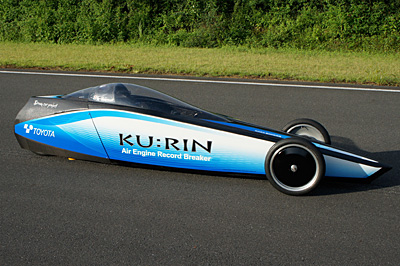Toyota engineers create air powered car


It’s not entirely steampunk, but it’s fairly close. Engineers at Toyota’s parent company, Toyota Industries Corporation, have assembled a prototype car that’s powered entirely by air.
The air functions like steam in a steam engine - by expanding and driving pistons, which ultimately moves the vehicle. A tank mounted in the back of the car provides its compressed air “fuel,” propelling it to speeds up to 129.2 kilometers per hour.
Toyota’s engineers are seeking certification from Guinness World Records for the world’s fastest air-powered car, Japan Broadcasting Company reports. The test run happened on Sept. 9 in Shirosato Japan. The tank was filled using a conventional air-conditioner compressor manufactured by Toyota.
Here's a video of it in action:
Toyota's air-powered car breaks speed records
The aforementioned “steampunk” reference is relevant, because inventors have been tinkering with air-powered vehicles for nearly two centuries. Range has always been an issue due to the low energy density of compressed air; Toyota's prototype can only go 3.2 KM before running out of "steam."
So, don’t except to see an air powered car in your Toyota dealership’s lot anytime soon – this was a proof of concept. You may, however, one day be able to purchase a hybrid vehicle that is partially air powered.
Researchers in Sweden have recorded a 60 percent increase in fuel economy by using a compressed air hybrid engine. They achieved that efficiency by retrofitting existing internal combustion engines and capturing energy from braking.
This goes to show that what’s old is in a way new again. The technology still has to be scaled to a street legal engine, but the economics of a hybrid drivetrain sans costly batteries could carry it forward.
Related on SmartPlanet:
Can air hybrid cars make it on the mean streets?
This post was originally published on Smartplanet.com